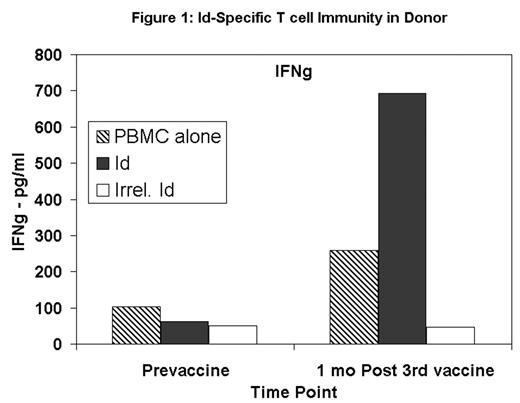Abstract
Reduced-intensity allogeneic stem cell transplantation (RIST) results in significant reduction in treatment-related mortality for multiple myeloma (MM) patients (pts); however, success with RIST is limited by a significant risk of relapse. To reduce the risk of relapse, HLA-matched sibling donors were vaccinated with patient-derived idiotype (Id) conjugated to keyhole limpet hemocyanin (Id-KLH) prior to stem cell donation with the goal of transferring tumor antigen-specific immunity. MM pts with HLA-matched siblings underwent plasmapheresis prior to treatment to generate Id-KLH vaccine. After vaccine generation donors received 3 SQ injections of Id-KLH + GM-CSF at 10, 8, and 4 weeks before G-CSF mobilized blood stem cell collection. During vaccine generation and donor immunizaton, MM pts received an induction regimen of EPOCH-F (etoposide, prednisone, vincristine, cyclophosphamide, adriamycin, fludarabine) to achieve a minimal disease state and deplete host T cells in preparation for RIST. MM pts then received a reduced-intensity conditioning regimen consisting of fludarabine (30 mg/m2/d x 4d) and cyclophosphamide (1200 mg/m2/d IV x 4d) followed by allogeneic stem cell infusion. MM pts were then vaccinated with the Id-KLH+GM-CSF at 3, 4, and 6 months post-RIST. Both donors and MM pts were monitored for Id-specific humoral and cellular responses. Five MM pts (ages: 50–60 years; IgG = 4, IgA = 1) and their respective donors have been enrolled onto study. Vaccine was generated from all 5 MM pts. All 5 donors completed vaccinations without significant complications; there were no grade 3 or 4 toxicities. Most common toxicities experienced by donors were erythema, pain, induration and pruritus at sites of injection and diffuse arthralgias. Four MM pts have undergone RIST. There has been one treatment-related death (GVHD) at day +67. Two patients are in CR at 15 and 9 months post-RIST; the third patient is in a PR at 4 months post-RIST. KLH-specific immunity was induced in all of the first 3 donors tested, and Id-specific T cell immunity was induced in 2 of the first 3 donors. In donor-MM pt pair #2 there was evidence that Id-specific T cell immunity was induced in the donor (Figure 1) and passively transferred to the recipient with RIST (Figure 2). Id-specific T cell responses were blocked with HLA Class I and Class II antibodies. These preliminary data confirm that Id-KLH vaccines can be safely and effectively given to normal stem cell donors. More importantly, these data suggest that tumor specific immunity can be induced and passively transferred to the recipient after RIST. Vaccination of donors with tumor-specific antigen represents a tactic to potentially reduce relapse after RIST.
Author notes
Corresponding author



This feature is available to Subscribers Only
Sign In or Create an Account Close Modal